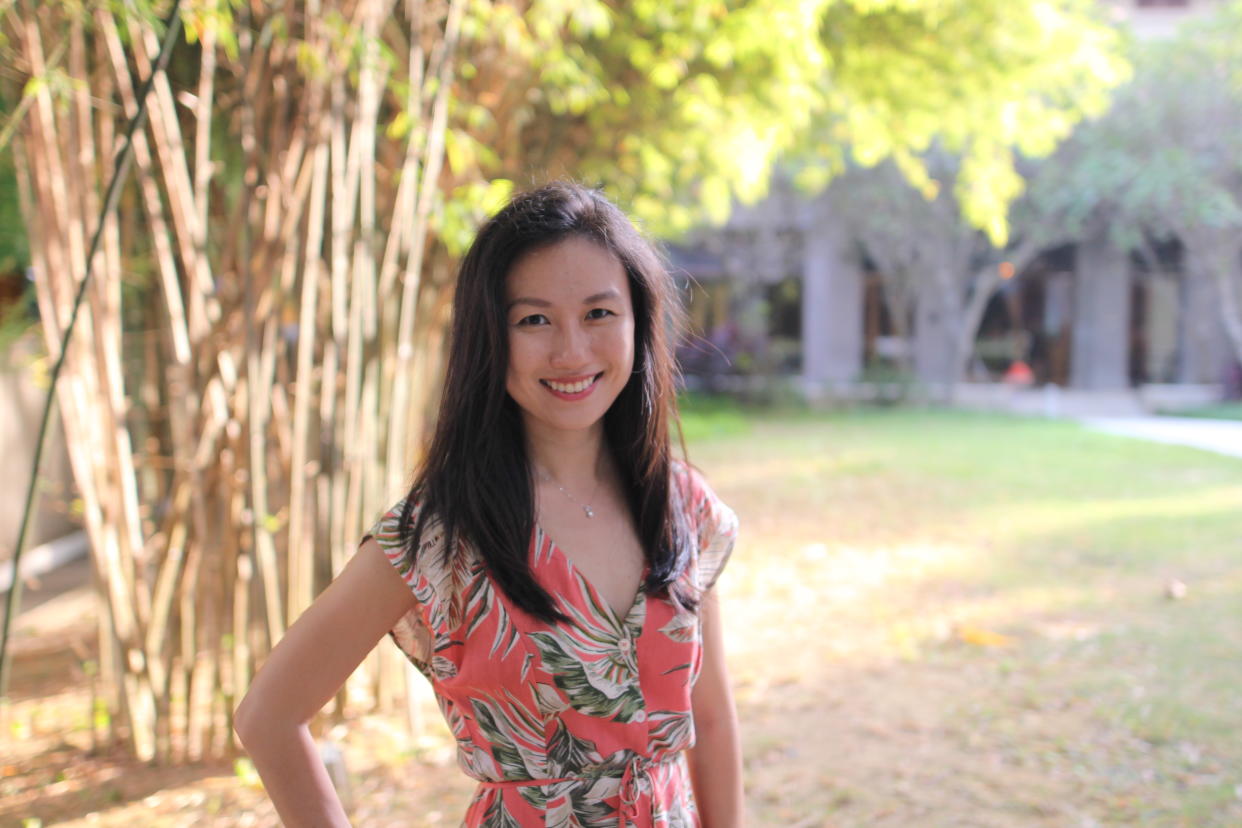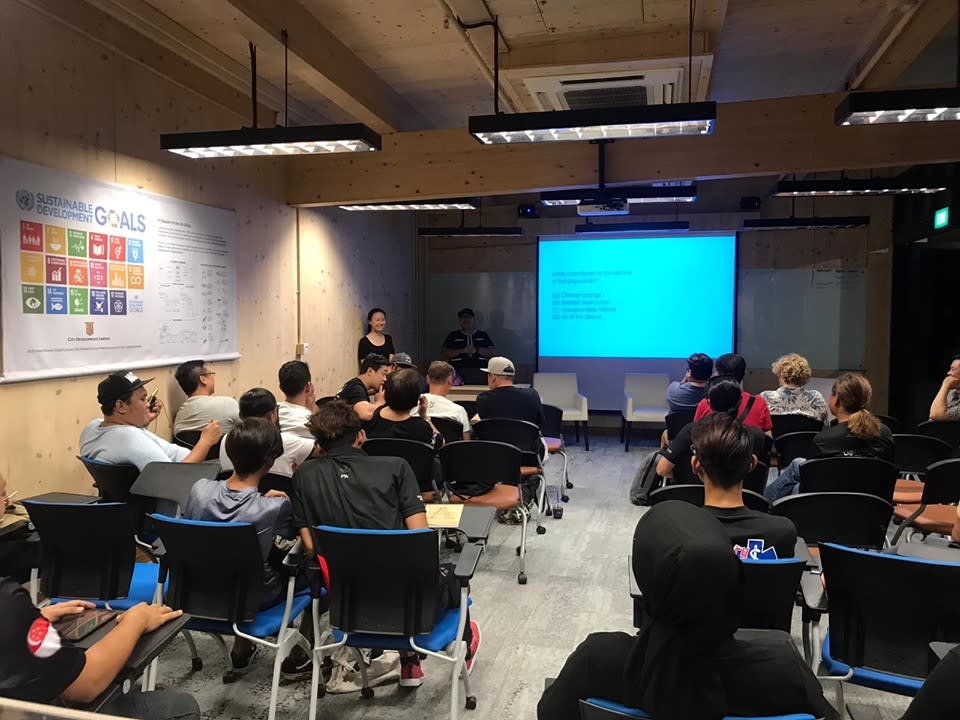INTERVIEW: Founder, Sue Ye on Marine Stewards Singapore's efforts within the fishing community

SINGAPORE — It is a bright and humid morning on a Monday in August as I made my way to meet Sue Ye, founder of Marine Stewards Singapore, who is championing marine conservation. These days, the weather on this island has been searingly and blindingly warm to the point where I now deploy an umbrella wherever I go. The irony of this heat is not lost on me—a good part of my conversation with Sue centres around climate change, overconsumption, and how human activities are causing these erratic temperatures we're experiencing now. "Climate change is all the rage now. People are starting to realise the impact it has in the world," Sue shared as I set down my equipment for today's interview.
READ MORE:
INTERVIEW: Chef ArChan of LeVel33 says, food to her is family
Kakeibo: Discover the Japanese art of saving money
Women On Top: Kamini Ramachandram of MoonShadow Stories
Marine Stewards, a marine conservation organisation, is set up to promote a healthy fishing culture through sustainable fishing guidelines, education and outreach. Sue and I chat over Chinese tea and Kueh Lapis (fresh from Batam, I've been told) while she speaks passionately about her organisation's efforts and what she imagines a sustainable world looks like.
Zat Astha: How do you describe what you do to someone you're meeting for the first time?
Sue Ye: At Marine Stewards, we are conserving our marine resources for future generations through education and outreach. We put together educational material, organise events and community engagement exercises, and participate in activities relevant to sustainable fishing and marine conservation. We have a fantastic team that is 100 per cent volunteer-run. The team comprises academics, fishing business owners, boat captains, and anglers. Everyone here has a passion and a heart for conservation.

What was your childhood like growing up, and how has this affected the work that you do now in the sustainability industry?
As a child, I was always very close to nature. My parents would bring me out for nature walks, and we would go out to sea often. I guess that gave me the love and respect for mother nature. Over time, I started to realise how humans consume without end. I used to ask myself: if there's one thing I could do for this world, what would I do? I thought it would be wonderful if I could help save the oceans.
Why specifically the sea?
I love being at sea, whether on a boat or in the water scuba diving. My family has a fishing charter business, and we noticed that we don't really have a culture of sustainable fishing in Singapore. Singapore used to be a fishing village, but now, over 50-60 years, the catch rates are a lot lower.
Why do you think that is?
It is partly due to habitat destruction like the clearing of mangroves and land reclamation, but I believe part of the impact comes from recreational anglers. They often don't realise that collectively, they make a difference. For many of them, they know in their hearts that they could be fishing more sustainably—like releasing smaller fish so they can grow, reproduce, and restock the ocean. At Marine Stewards, our slogan is 'Let It Go, Let It Grow!'. I've been fortunate to have met many like-minded people who are supportive of our initiative. Some of them have children and worry for a future where their kids will not have any fish to enjoy.

Do you think sustainability is a self-serving act or something that people do because they genuinely care for the future? Or do you think it can be both?
It differs for each person. Generally, it is easier to appeal to the self-interests of individuals. For example, most anglers want to catch more fish. So, we educate about how practising catch and release will result in them catching more fish over time. For others, they are driven by their love for Earth, and a desire to co-exist in a better balance.
How strong is a link between climate change and unsustainable fishing?
It's not a direct causal effect. But the root cause for both is humans' overconsumption. The way we strip the Earth's resources causes climate change, and it is that very same mentality that drives overfishing.
Tell me more about Marine Steward's Catch and Release efforts? What does it entail?
Catch and release essentially means that if an angler catches a vulnerable or endangered species of fish below a certain length, they let it free for it to grow and reproduce. Singapore is an excellent place to start because we are relatively small, and that makes it more manageable. We don't have commercial fisheries or trawlers, but we do have a lot of recreational anglers; we estimate about 20,000. These are the people we want to focus our efforts on.
That's… a lot.
Yes. That's why our catch and release efforts are so important. If we can reach just 500 anglers, and they release 2 fish of 500 grams each time, that's half a ton of fish released each day. Over 8 weekends, that's 4 tons of fish released monthly to let them grow, spawn, and reproduce. This will significantly help the population of fish in Singapore to increase.
Are there naturally a lot of fish to fish in our seas?
If you ask most veteran fishermen, the fish that we have now is a fraction of what we used to get just a few decades ago. Being in the tropics, we have a large diversity of fish. That gives me hope that through our efforts, the fish stocks in our water stand a good chance to recover and grow.
Is the drop in fish population nature's way of telling us that we will eventually have no more fish left to eat, so we have to turn to other food sources?
I think this is nature's way of telling us to respect the resources we have. It's not that we won't have any more fish to eat because there will always be fish farms. But the realm of farmed food is a different conversation entirely. I watched a documentary once that says humans and their livestock account for 96% of the biomass of all mammals on Earth whereas wild mammals only account for 4%.
That's every little.
Yes. And the problem with fish, in particular, is that it's underwater. Unless you go diving, you don't see it. You don't really think about the wildlife in the seas—out of sight, out of mind.

What has been the biggest misunderstanding the public have about overfishing?
The first misconception people have is about the act of fishing itself that fishermen want to deplete the sea. The fact is that fishermen work very hard for 9 to 10 hours a day to catch a few fish, so they know first-hand how precious the resource actually is. I believe they genuinely appreciate the catch they get, and they want the oceans to be sustainable for them to continue their livelihoods and activities.
I don't think there's much misunderstanding about overfishing per se. It's a known fact. Ninety per cent of the worlds' marine fish stocks is either overfished or maximally fished. The real problem is that a lot of fishermen don't believe that their individual catch and release conservation efforts will make a tangible difference. They will say "Oh, I catch only three or four fish daily. Or, the decline is due to pollution or land reclamation, not me." They need to realise that every single angler, and every single fish released, collectively makes a huge difference.
What are some of the guidelines you've drawn up for these anglers?
We are introducing recommendations and guidelines for the fishing community. Many countries have strict laws and fisheries management with regards to catch and release. For example, juvenile fish below a certain length must be released. In Singapore, our guidelines are slightly more relaxed—for a start, we want to encourage people to start measuring the lengths of the fish, rather than weigh them vertically. We also want them to get used to the act of releasing undersized fish. We want to shift the fishing culture in Singapore to one that is more sustainable and to convince them that their actions do affect the ecosystem.
Are these guidelines you've drawn up in line with standards set internationally?
Yes, the principles are the same. Places like Australia, Europe, and the USA have fisheries management laws in place, including size limits, bag limits, open and close seasons and licenses that are backed up by enforcement. As a result, children at a young age are taught that this should be the way to fish. For now, our guidelines are introduced as recommendations and are more relaxed compared to other countries. We hope to educate all anglers in Singapore and cultivate change over generations—it's a long term project.
What does a world supported by good sustainable practices look like to you?
It would be a world where we consume a lot less. We would replace our consumerism-led lifestyle with one that is centred around love, human relationships, and nature. There would be a lot more mindfulness in our everyday decisions and actions. Also, more people would join in to become active stewards of our planet. With some hope and a lot of determination, our natural world would once again flourish and prosper.


